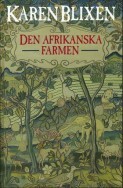You need to sign in or sign up before continuing.
Take a photo of a barcode or cover
adventurous
challenging
dark
emotional
funny
informative
inspiring
lighthearted
reflective
relaxing
sad
medium-paced
Colonial Africa.
emotional
informative
reflective
slow-paced
This book has been in my To Read list since forever and finally I got myself to read it. It took me a few pagers to get into it but then... it’s a gorgeous book.
It’s a weird kind of memoir, since while the author tells about her time in Africa she doesn’t talk about herself that much. I’ve read bad reviews about this book, as racist and condescending, as the white view on natives. I did not feel that way.
This book happened 100 years ago, while Africa was being colonised. Sadly, it happened. But what I got from this author was a great care and respect towards these people. Yes, it did annoy me for example the word “squatters” about people who were in their rightful land. But you can tell that, unlike most white people who saw them as savages she learned from them and respect them.
You can tell for the way she writes how much she cares for them. I can’t help think that these people, have been immortalised forever and that today 100 years later I read a bit about the lives of them. Each one of them.
The writing was beautiful. It reminded me to Edith Wharton, although the styles are nothing a like. But mostly because the writing is effortlessly gorgeous.
It’s a weird kind of memoir, since while the author tells about her time in Africa she doesn’t talk about herself that much. I’ve read bad reviews about this book, as racist and condescending, as the white view on natives. I did not feel that way.
This book happened 100 years ago, while Africa was being colonised. Sadly, it happened. But what I got from this author was a great care and respect towards these people. Yes, it did annoy me for example the word “squatters” about people who were in their rightful land. But you can tell that, unlike most white people who saw them as savages she learned from them and respect them.
You can tell for the way she writes how much she cares for them. I can’t help think that these people, have been immortalised forever and that today 100 years later I read a bit about the lives of them. Each one of them.
The writing was beautiful. It reminded me to Edith Wharton, although the styles are nothing a like. But mostly because the writing is effortlessly gorgeous.
emotional
funny
reflective
relaxing
medium-paced
Trying to read this before I read "Circling the Sun" by Paula McLain (novelization of the life of Dinesen/Blixen's "friend" (?) Beryl Markham) but it's off to a rocky start.
Ok, I did it. I finished the book. From what I've read on the internet, Karen Blixen lived an adventurous and interesting life, so I kept plodding through this book wondering when things would start to happen to her. She shares a lot of stories about the local people and her servants, which she repeatedly compares to animals. This made me uncomfortable. Friends and a surprise husband pop up here and there, without any explanation of who they are to her or how she feels about them.
There is a lot of flowery description of scenery, if you are into that sort of thing. I liked the part where she goes flying with Denys Finch Hatton, but I wouldn't have known he was the love of her life from reading the book, which is strange to me. An elderly man who dies on her property (Old Knudsen) gets more real estate in the book than Finch Hatton does.
At the end of the book, Blixen leaves her farm and (according to her) spends a lot of time trying to decide if she should shoot her dogs and horses or give them to friends. Wow Karen.
In summary- not my cup of tea.
Ok, I did it. I finished the book. From what I've read on the internet, Karen Blixen lived an adventurous and interesting life, so I kept plodding through this book wondering when things would start to happen to her. She shares a lot of stories about the local people and her servants, which she repeatedly compares to animals. This made me uncomfortable. Friends and a surprise husband pop up here and there, without any explanation of who they are to her or how she feels about them.
There is a lot of flowery description of scenery, if you are into that sort of thing. I liked the part where she goes flying with Denys Finch Hatton, but I wouldn't have known he was the love of her life from reading the book, which is strange to me. An elderly man who dies on her property (Old Knudsen) gets more real estate in the book than Finch Hatton does.
At the end of the book, Blixen leaves her farm and (according to her) spends a lot of time trying to decide if she should shoot her dogs and horses or give them to friends. Wow Karen.
In summary- not my cup of tea.
adventurous
emotional
hopeful
inspiring
slow-paced
Karen Blixen on parhaimmillaan kuvatessaan Afrikan luontoa. Hänen sanoissaan piirtyy leijonan pehmeät askeleet savannilla, yllä kaarteleva korppikotka ja öisin soiva sirkkojen siritys, jota säestää nuotion paukahdukset.
Kirjan kolonialismi ja rasismi vyöryy kertomuksessa päälle voimalla, ja avaa ikkunan sadan vuoden takaisin eurooppalaisen ajatuksiin. Samalla kaikessa kuultaa, että Blixenin kertomus on hänelle kertomus kultaisesta kadonneesta paikasta, jossa kolonialismikin on romantisoitu piirre paikassa. Osaltaan nautin suunnattomasti lukiessani Blixenin omia sanoja ja kuvauksia, koska tiesin jo Mia Kankimäen "Naiset joita ajattelen öisin" -kirjan pohjalta, että joskus Blixen sairasti tai masentui, eikä päässyt aamuisin sängystä ylös, ja Tom Buk-Swientyn "Naarasleijona" oli opettanut, että Afrikka vei Blixeniltä kaiken. Elämäkertojen jälkeen Blixenin omat sanat asettuivat kontekstiin, ja samalla en auttoivat ymmärtämään, miksi Afrikka joka vei kaiken oli silti kaikista rakkain aika.
Kirjan kolonialismi ja rasismi vyöryy kertomuksessa päälle voimalla, ja avaa ikkunan sadan vuoden takaisin eurooppalaisen ajatuksiin. Samalla kaikessa kuultaa, että Blixenin kertomus on hänelle kertomus kultaisesta kadonneesta paikasta, jossa kolonialismikin on romantisoitu piirre paikassa. Osaltaan nautin suunnattomasti lukiessani Blixenin omia sanoja ja kuvauksia, koska tiesin jo Mia Kankimäen "Naiset joita ajattelen öisin" -kirjan pohjalta, että joskus Blixen sairasti tai masentui, eikä päässyt aamuisin sängystä ylös, ja Tom Buk-Swientyn "Naarasleijona" oli opettanut, että Afrikka vei Blixeniltä kaiken. Elämäkertojen jälkeen Blixenin omat sanat asettuivat kontekstiin, ja samalla en auttoivat ymmärtämään, miksi Afrikka joka vei kaiken oli silti kaikista rakkain aika.
I have mixed feelings about this book. I bought it on a whim and because I wanted to see the movie, which is a classic that everyone raves about. To be honest, I still want to see the movie, and I have a feeling it's way better than the novel, because, well, freaking Meryl Streep, but the book... oh well, let's just say I won't be re-reading it or recommending it.
It's not that the writing is bad, it really isn't. It paints a picture of colonial Africa that one probably won't see anywhere else. It's almost poetic at times. I quite admire Karen Blixen for being so ahead of her times (remember, we're talking about the 20s, when women weren't, as a rule, very self sufficient, so being a woman who owned a farm was very progressive). She sincerely loved her farm and Africa and it must have hurt a lot to lose it all at once and return to Europe all alone.
But the thing is, I simply cannot put myself in her shoes and get over the fact that she is so condescending in her speech about the people of the land (the Kikuyus and the Masai), about white people versus natives, about hunting... I get it that this was the norm of the era, but Europeans laid waste to so many territories due to their excessive desire for wealth and power that I cannot read this book without being biased (and yes, I'm European and I still don't agree with this).
If you manage not to be biased or horrified about the treatment of the people and animals and can see only the beauty of the writing, the novel is a good read and it paints a lovely picture of Africa and its people and culture. I, unfortunately, could only see the destruction left behind by the colonists.
It's not that the writing is bad, it really isn't. It paints a picture of colonial Africa that one probably won't see anywhere else. It's almost poetic at times. I quite admire Karen Blixen for being so ahead of her times (remember, we're talking about the 20s, when women weren't, as a rule, very self sufficient, so being a woman who owned a farm was very progressive). She sincerely loved her farm and Africa and it must have hurt a lot to lose it all at once and return to Europe all alone.
But the thing is, I simply cannot put myself in her shoes and get over the fact that she is so condescending in her speech about the people of the land (the Kikuyus and the Masai), about white people versus natives, about hunting... I get it that this was the norm of the era, but Europeans laid waste to so many territories due to their excessive desire for wealth and power that I cannot read this book without being biased (and yes, I'm European and I still don't agree with this).
If you manage not to be biased or horrified about the treatment of the people and animals and can see only the beauty of the writing, the novel is a good read and it paints a lovely picture of Africa and its people and culture. I, unfortunately, could only see the destruction left behind by the colonists.
challenging
informative
reflective
slow-paced
*My rating: 2.5
Karen Blixen, pen name Isak Dinesen, has a way with words, painting a wonderful picture of the landscapes of 20th century Kenya. However, the story left me with conflicting feelings. On one hand, the author seems sincere in her efforts to support the native people, while at the same time sounds patronizing about their cultures, beliefs and way of life in general. I struggled to finish the last few pages of the book as my mind tried to reconcile this incongruity. However, I would be amiss if I didn't give a shout out to the feminist aspects of the book - female protagonist independently managing a coffee plantation in a foreign land during early 20th century! That deserves at least an extra 0.5 star!
Karen Blixen, pen name Isak Dinesen, has a way with words, painting a wonderful picture of the landscapes of 20th century Kenya. However, the story left me with conflicting feelings. On one hand, the author seems sincere in her efforts to support the native people, while at the same time sounds patronizing about their cultures, beliefs and way of life in general. I struggled to finish the last few pages of the book as my mind tried to reconcile this incongruity. However, I would be amiss if I didn't give a shout out to the feminist aspects of the book - female protagonist independently managing a coffee plantation in a foreign land during early 20th century! That deserves at least an extra 0.5 star!
inspiring
relaxing
sad
slow-paced




